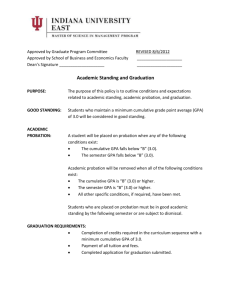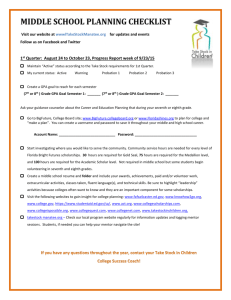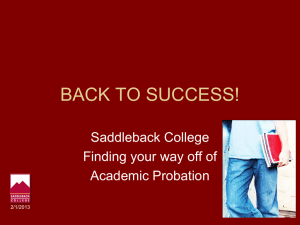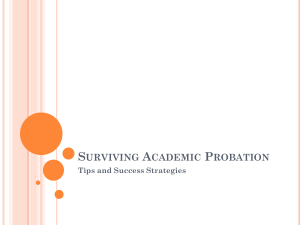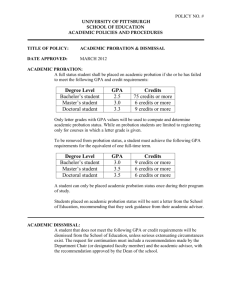What is Academic Suspension? - University of Colorado Boulder
advertisement
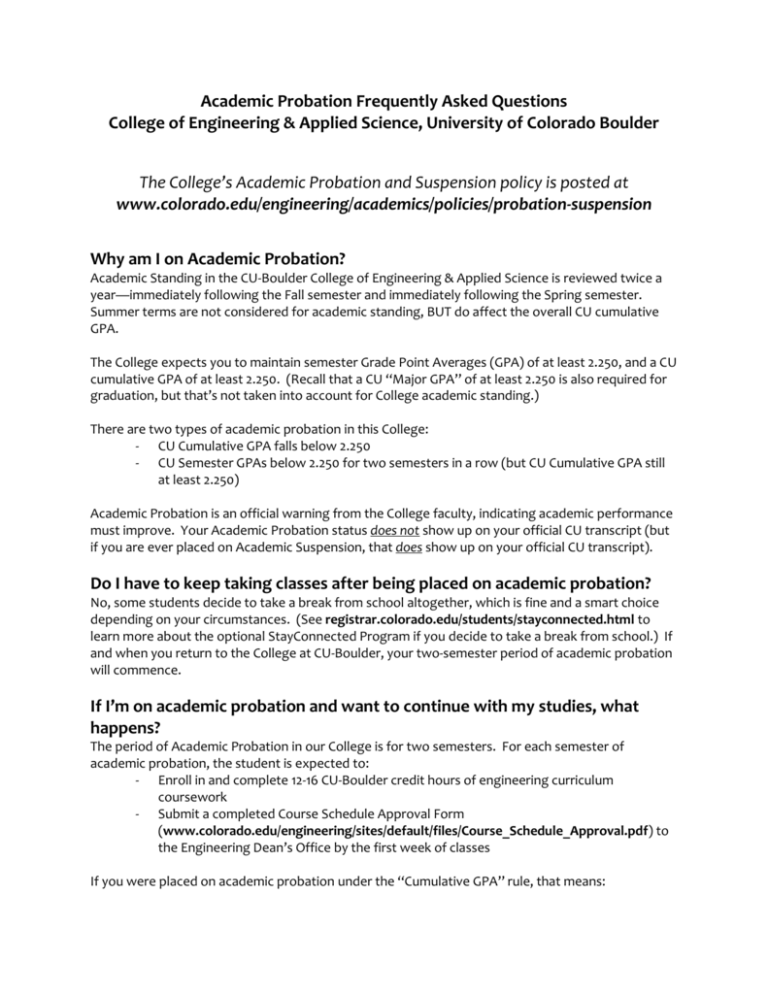
Academic Probation Frequently Asked Questions College of Engineering & Applied Science, University of Colorado Boulder The College’s Academic Probation and Suspension policy is posted at www.colorado.edu/engineering/academics/policies/probation-suspension Why am I on Academic Probation? Academic Standing in the CU-Boulder College of Engineering & Applied Science is reviewed twice a year—immediately following the Fall semester and immediately following the Spring semester. Summer terms are not considered for academic standing, BUT do affect the overall CU cumulative GPA. The College expects you to maintain semester Grade Point Averages (GPA) of at least 2.250, and a CU cumulative GPA of at least 2.250. (Recall that a CU “Major GPA” of at least 2.250 is also required for graduation, but that’s not taken into account for College academic standing.) There are two types of academic probation in this College: - CU Cumulative GPA falls below 2.250 - CU Semester GPAs below 2.250 for two semesters in a row (but CU Cumulative GPA still at least 2.250) Academic Probation is an official warning from the College faculty, indicating academic performance must improve. Your Academic Probation status does not show up on your official CU transcript (but if you are ever placed on Academic Suspension, that does show up on your official CU transcript). Do I have to keep taking classes after being placed on academic probation? No, some students decide to take a break from school altogether, which is fine and a smart choice depending on your circumstances. (See registrar.colorado.edu/students/stayconnected.html to learn more about the optional StayConnected Program if you decide to take a break from school.) If and when you return to the College at CU-Boulder, your two-semester period of academic probation will commence. If I’m on academic probation and want to continue with my studies, what happens? The period of Academic Probation in our College is for two semesters. For each semester of academic probation, the student is expected to: - Enroll in and complete 12-16 CU-Boulder credit hours of engineering curriculum coursework - Submit a completed Course Schedule Approval Form (www.colorado.edu/engineering/sites/default/files/Course_Schedule_Approval.pdf) to the Engineering Dean’s Office by the first week of classes If you were placed on academic probation under the “Cumulative GPA” rule, that means: - At the end of the first semester of academic probation, your semester GPA must be at least 2.250. At the end of the second semester of academic probation, your semester GPA and cumulative GPA must both be at least 2.250 each. If you were placed on academic probation under the “Consecutive Semester GPA” rule: - At the end of the first semester of academic probation, your semester GPA and cumulative GPA must both be at least 2.250 each. - At the end of the second semester of academic probation, your semester GPA and cumulative GPA must both be at least 2.250 each. If I’m on academic probation and want to take a break and then come back— what happens? See previous answer for the particulars, but the active Academic Probation period will simply commence when you enroll again in the College. What if I do well academically in my first semester of academic probation? The normal period of academic probation in the College of Engineering and Applied Science is two semesters. However, if a student completes at least 12 graded credit hours of CU-Boulder engineering curriculum coursework in the student’s first semester of academic probation (i.e., fulfilling all academic probation requirements, along with no Incomplete grades), and the student’s semester GPA is at least 3.250, plus the cumulative GPA is at least 2.250, the student’s strong performance allows him or her to come off of probation a semester early and be restored to good academic standing. Exploring the Reasons Students go on academic probation for a variety of reasons, but here are the top 10 reasons reported by students who went on academic probation: - Study Habits Time Management Didn’t Put In the Time Needed Lack of Motivation Missed 10% or More of Classes Poor Test Taking Skills Inadequately Studied for Tests No Excuses (my neglect) Didn’t Use Campus Resources Studied Alone Overwhelmed by Being in College If you look at the list above, the good news is that most of these are within your control to positively change. For example, CAPS [hotlink to www.colorado.edu/counseling], SASC [hotlink to www.colorado.edu/sasc], and the BOLD Center [hotlink to bold.colorado.edu] (see below for all) offer workshops on test anxiety and improving your test-taking skills. Take some time to seriously reflect on your personal situation so you can identify the factor(s) you need to address. What to Do to Improve Now is the time to be proactive, and reach out for assistance to support your personal and academic success. Students who go on academic suspension following academic probation typically have not availed themselves of these resources: Academic Advisors ~ See www.colorado.edu/engineering/academics/advising-registration/advisors BOLD Center ~ Tutoring, Networking, Peer Advocates, Power Hours and more! bold.colorado.edu, ECCE 100 Career Services ~ Interest Inventories, Strengths Assessment, Career Guidance careerservices.colorado.edu, C4C (N352) Counseling and Psychological Services (CAPS) ~ Test/Anxiety Management, Stress Reduction, Sleep Issues, etc. www.colorado.edu/counseling Bounce Back Program ~ Offered by CAPS (above) Engineering students who have gone on academic probation have great things to say about this program! www.colorado.edu/counseling/groups-workshops/bounce-back, C4C (S440) Student Academic Services Center (SASC) ~ Study Strategies Workshops and 1-on-1 skills development www.colorado.edu/sasc, Fleming Law 141 Disability Services ~ Special accommodations to help you succeed www.colorado.edu/disabilityservices, C4C (N22) Wardenburg Health Center ~ Take care of any physical or psychological health issues www.colorado.edu/healthcenter Factors Which Support Academic Success Engineering students who make it through our B.S. program attribute the following top 5 factors to their success (not in any particular order): - Self-Motivation - Natural Ability - Working with Others - Friends Support - Family Support The next 5 reasons include (again, not in any particular order): - Time Management Skills - Enjoyed Course Work - Faculty Support - Future Rewards Stress Relief We share these with you so that you might contemplate how these apply to you and if making any changes might be in order. What Do I Have to Do Now? You need to have your major department academic advisor approve a Course Schedule Approval Form (www.colorado.edu/engineering/sites/default/files/Course_Schedule_Approval.pdf) for EACH SEMESTER of academic probation, so meet with him/her before the beginning of each semester of academic probation to discuss your proposed course schedule and get it approved in writing. You should enroll in 12, but no more than 16, credit hours towards your major’s degree requirements per each semester of academic probation. Then you need to turn in the Course Schedule Approval Form to the Engineering Dean’s Office (east end of Engineering Center Lobby) by the first week of classes. The Assistant Dean for Students reviews all these forms and will contact you if there are any questions or concerns. Calculating your GPA If you take a look at your CU transcript, you’ll see that your CU GPA is composed of your “quality points” divided by your “quality units” (or credit hours). You should consider how many credit hours and the grades you’ll need to achieve to make it through your period of academic probation, which you can experiment with using an Excel spreadsheet. Keep in mind the following: - Incomplete grades are not included in the computation Passing “P” (Pass/Fail) grades are not included in the computation Failing “F” (Pass/Fail) grades are included in the computation - A = 4 quality points per credit hour, A- = 3.7, B+ = 3.3, B = 3, B- = 2.7, C+ = 2.3, C = 2, C- = 1.7, D+ = 1.3, D = 1, D- = 0.7, and F = 0 So make your own spreadsheet to work out GPA possibilities, set goals, and track progress. Additional Important Information Be mindful of the College’s “3 strikes” rule for courses which apply towards degree requirements, which is: A student may not enroll more than three times in a course that applies towards degree requirements; furthermore, after the third attempt, a student may not substitute an equivalent course. This means that a student has a maximum of three opportunities to show sufficient mastery of a particular subject area, whether the course is from CU-Boulder or through another collegiate institution. Furthermore, the most recent occurrence of the subject is the grade which is applied (e.g., to meet a grade required for a prerequisite course). If a student has earned AP or IB college credit and then subsequently enrolls in that course content, the later grade is applied. All grades will be employed to calculate grade point averages, including any courses which are repeated. Coursework taken elsewhere than CU will not affect your CU GPA (courses elsewhere may transfer in if at least grade of C- earned, but will not affect the CU GPA). While you are on academic probation, some major departments may exercise the option to hold off until you make it successfully through your first semester of academic probation before they will approve a major change into that department. What is Academic Suspension? A student is placed on Academic Suspension when he/she fails the terms of academic probation described above. Academic Suspension also occurs whenever the CU Cumulative GPA falls below 1.000 (unless student has just completed the very first semester at CU-Boulder). Academic Suspension forces a break from “Main Campus” classes so that the student can address ongoing issue(s). A student on academic suspension must take time off from “Main Campus” classes as follows: - 1st academic suspension – 1 semester - 2nd academic suspension – 2 semesters - 3rd academic suspension – the student may no longer return to CU-Boulder Engineering In addition to taking this break form “Main Campus” classes, in order to return from academic suspension the student must have a CU cumulative GPA of at least 2.250 in order to be able to return to this College (which may be accomplished by completing Continuing Education “Boulder Evening” and/or “Independent Learning” classes, and/or Summer Session classes). While on academic suspension, a student is still affiliated with and is part of the Engineering College, in his/her major (it’s only after a 3rd academic suspension that a student would not be allowed to return to the CU-Boulder College of Engineering and Applied Science). After meeting the terms of academic suspension, a student returning to the College is on academic probation for two semesters. What if I’m Thinking of Leaving Engineering? Students who are considering a transfer out of the College of Engineering and Applied Science and into another college on campus should first take the short survey at www.colorado.edu/engineering/thinkingofleaving. After completing that, make an appointment with First-Year Experience Coordinator Lelei Finau-Starkey (call 303-492-5071), who is happy to meet with you to discuss options and advise on next steps.

